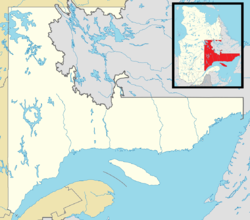Betsiamites, Quebec
| Pessamit | |
|---|---|
| Indian reserve | |
 |
|
| Coordinates: 48°57′N 68°39′W / 48.950°N 68.650°WCoordinates: 48°57′N 68°39′W / 48.950°N 68.650°W | |
| Country |
|
| Province |
|
| Region | Côte-Nord |
| Regional county | None |
| Formed | 1861 (reserve) |
| Government | |
| • Chief | René Simon |
| • Federal riding | Manicouagan |
| • Prov. riding | René-Lévesque |
| Area | |
| • Land | 256.16 km2 (98.90 sq mi) |
| Population (2011) | |
| • Total | 2,420 |
| • Density | 9.4/km2 (24/sq mi) |
| Time zone | EST (UTC-5) |
| • Summer (DST) | EDT (UTC-4) |
| Postal Code | G0H 1B0 |
| Area code(s) | 418 and 581 |
| Website | www.pessamit.ca |
Pessamit (formerly Betsiamites, or Bersimis), is a First Nations reserve and Innu community in the Canadian province of Quebec, located about 50 kilometres (31 mi) southwest from Baie-Comeau along the north shore of the Saint Lawrence River at the mouth of the Betsiamites River. It is across the river directly north of Rimouski, Quebec. It belongs to the Pessamit Innu Band.
The reserve includes the communities of Betsiamites and Papinachois.
It has been argued that the word Betsiamites could mean "those arriving by river". However, most authors today agree that the word came from the Innu root "Pessamit", meaning of "place where there are leeches or lampreys or sea eels". The dialect spoken at Mistissini uses the older form "upesciyâmîhc" as the locative noun referring to the town, and the form "upesciyâmîw-iyiniw" in reference to the people of Pessamit. The local form of the name can be explained by phonological changes that have occurred in the local dialect. In particular, the dialect of Pessamit has undergone the following phonological changes - it regularly drops short initial vowels, it has lost consonantal pre-aspirations, it has coalesced -sc- to -ss-, and final -c's have changed to final t's. This has resulted in local pronunciation of Pessamit from the more historical upesciyâmîhc.
The names Betsiamites and Bersimis have been in use concurrently since the mid 19th century. The Innu and Oblate missionaries used Betsiamites, whereas Bersimis was preferred by Admiral Henry Wolsey Bayfield during his hydrographic surveys of the St. Lawrence and by the Hudson's Bay Company. Further interchangeable use between these names can be seen from the designation of the post offices on both sides of the Betsiamites River: on the west side, it was called Bersimis from 1863 to 1910, then Moulin-Bersimis (Bersimis-Mills) until 1945, and Rivière-Bersimis from then on. On the east side in the Innu village, the post office opened as Notre-Dame-de-Betshiamits in 1881, renamed to Bersimis in 1898 until 1919, and then took the name Betsiamites when demanded by the people. Similarly, the Indian reserve went through a few name changes: first Bersimis, then Betsiamites in 1981, and since 2008, Pessamit.
Indigenous people had lived or visited the site for centuries prior to arrival of Europeans. Early in the 17th century, Samuel de Champlain reported the presence of an Innu village on the North Shore of the Saint Lawrence that he identified as Sauvages Bersiamiste on his map of 1632.
...
Wikipedia

